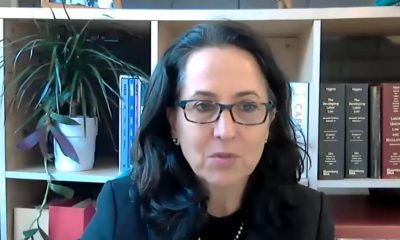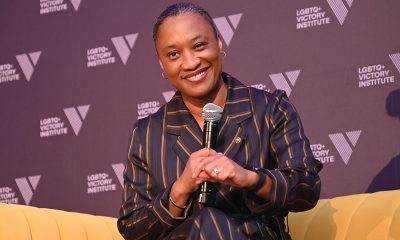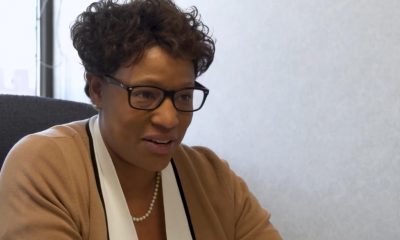Opinions
Obama’s win is victory for America
Now the hard work begins on a progressive agenda
On Tuesday we saw four ballot initiatives on marriage equality win and the election of Tammy Baldwin in Wisconsin as the first out lesbian in the United States Senate. Both are events I never thought I’d see in my lifetime. Other wins of note are those of Sean Patrick Maloney in New York; Mark Takano in California; Mark Pocan in Wisconsin; and, of course, the big prize, the re-election of President Barack Obama to a second term. These are all victories not only for the LGBT community but for America.
Now the work begins. With Congress still divided, the president will have his work cut out for him. Obama will never have to run for office again so it is the hope of many that he will use all the powers of the presidency, including the bully pulpit, to move forward a progressive agenda that will set the nation on a positive path for the foreseeable future.
The LGBT community had a big role in his win, from our votes to our money, and we, along with many others, can expect the president to demand action on an inclusive ENDA, a repeal of DOMA, immigration reform and environmental issues. We will expect him to demand action on tax reform, balancing the budget and moving forward on long-term solutions to extend the life of Medicare and Social Security.
This is a huge agenda and one that may not all happen, but there is no reason to hold back on fighting for all those issues. If Congress doesn’t do its job, at least the people will see a clear agenda from the White House and can speak up to change the Congress in 2014.
Many considered Obama’s first term too timid. There are many things he gets credit for and the people gave him a second term because of what he accomplished. Ending the war in Iraq, passing healthcare reform and keeping us from falling off a financial cliff were enough to earn my enthusiastic support. But clearly many in the country didn’t feel that way. Now the president has the opportunity to show them that he has the resolve to move on a host of issues that will carry the nation safely through the 21st century. It is time to stop talking about these issues in only nuanced terms but rather to move forward boldly. Leadership is staking out strong positions and recognizing that while the people and the Congress may not be with you at first, with reason and appropriate compromise, you can get them to follow. People respect strength and resolve and that is what the president will need to show in his second term.
The LGBT community needs to support him while at the same time push for more action. We need to help him convince the Congress about the issues we care about and focus our attention on both sides of Pennsylvania Avenue. It will not be enough to get the White House to speak out, though that is crucial, but we need to inundate the Congress with our message and let them know that the time is now for them to act because we demand our full civil and human rights. It is not enough to wait for the courts to act but we must push Congress for action on a myriad of issues as well. As a community we must strengthen our ties with the Latino community and work to advance women’s rights and other civil rights as we all fight for the rights of individuals to live their lives with full and clear legal protections.
Our Declaration of Independence states, “We hold these truths to be self-evident, that all men are created equal, that they are endowed by their Creator with certain unalienable Rights, that among these are Life, Liberty and the pursuit of Happiness.” Our Constitution declares, “We the People of the United States, in Order to form a more perfect Union, establish Justice, insure domestic Tranquility, provide for the common defence, promote the general Welfare, and secure the Blessings of Liberty to ourselves and our Posterity, do ordain and establish this Constitution for the United States of America.”
We hold up these documents, along with the amendments to the Constitution and the Bill of Rights, as a blueprint for democracy. We call for the separation of church and state because our nation was founded by many who came here fleeing religious persecution at home. So now is the time to bring these documents to fulfillment in our own country and to ensure that each of us can claim “our unalienable Right to Life, Liberty and the pursuit of Happiness.”
Opinions
The High Road – Walking the Pathway to National Cannabis Legalization
Grassroots organizing has been the driving force behind shifting public perception and pushing for policy changes in the cannabis industry

As we gear up for a major election year, the buzz around cannabis legalization is getting louder. Policymakers are starting to see the need for comprehensive reform, while advocates and small business owners in the industry are cautiously optimistic about the future. But let’s not kid ourselves, this system was designed to keep certain communities out, and it’s crucial that we continue to address these deep-rooted inequities as we blaze the trail forward. A step towards legalization that doesn’t prioritize equity and dismantle the barriers that have held back marginalized groups would be a major bummer. In this op-ed, we’re going to take a groovy journey through the evolution of grassroots organizing in the cannabis industry and highlight the importance of social equity in achieving true national cannabis legalization and boosting our humanity along the way.
Over the years, I’ve been right in the thick of it, helping to build grassroots organizations like Supernova Woman and Equity Trade Network. These groups have been on the frontlines, fighting for cannabis programs in Oakland and San Francisco. I’ve also rocked my own brand, Gift of Doja, and organized the first Cannabis Garden at a major neighborhood street fair, Carnaval San Francisco. I even served as the chair of the first Cannabis Oversight Committee in the nation. But the real magic has always happened in when working in coalitions. Each individual and organization brings a unique piece to the puzzle. Grassroots organizating is as challenging as crafting a democratic society but is worth the effort in generating workable implementable solutions. Collective efforts have been game-changers in shifting public opinion and paving the way for major policy changes at both the state and local levels.
As we navigate the path towards cannabis legalization, lobbyist and lawmakers can’t forget about the small business owners who have been grinding to build their dreams. Political advocacy and lobbying are important, but if we’re not uplifting the voices and experiences of those who have been fighting on the ground, we’re missing the mark. Big companies can hire lobbyists, but small business owners don’t have that luxury and if we are not in the room we are on the table. Coalitions allow for us to be in the room when we can’t physically be there. Our communities, especially people of color, have been hit hard by systemic oppression, from over-policing to mass incarceration and limited economic opportunities to limit our ability to be in the room of power and decision making.
Social equity needs to be front and center in any cannabis legalization efforts. It’s not enough to just remove criminal penalties or create a legal market. We need to actively work on repairing the damage caused by years of prohibition. That means fighting for resources, investment, and low-interest loans for small businesses. It means creating a tiered fee and tax structure that doesn’t crush the little guys. And it means opening up equity programs to all industries, not just cannabis. Social justice without economic access and repair is like a joint without a lighter – it just won’t spark the change we need. We have a responsibility to evolve the economy and break down unnecessary barriers. Activism, social justice, and economic reform are all connected, man.
Industry leaders, culture creators, advocates, and consumers alike, we all need to step up and promote social equity. It’s on us to support initiatives that provide resources, mentorship, and funding for individuals from affected communities to enter the legal cannabis market. And let’s not forget the power of our wallets. Buying from companies that align with our values and support the work we believe in can send a powerful message. Voting with our dollars might just be more impactful than showing up at the ballot box.
As we head into a major election year, the cannabis industry is at a crossroads. It’s a time for drumming up voter interest and for candidates to make promises that grassroots organizations have fought hard for. Small business owners will be navigating a tricky landscape, but we can’t lose sight of the power of collective work. By keeping social equity at the forefront, we can undo the harms of the past while building new frameworks that will shape a brighter future for all.
In conclusion, grassroots organizing has been the driving force behind shifting public perception and pushing for policy changes in the cannabis industry. But let’s not forget that true national cannabis legalization can only be achieved if we address social equity. It’s time for us to come together, listen to the voices of those most impacted, and walk the high road towards a future where cannabis legalization isn’t just about business opportunities, but also about healing and empowerment for all communities. Let’s light up a joint of social justice and blaze a trail towards a better tomorrow.
Nina Parks, Co-Founder of Equity Trade Network & Supernova Women [email protected]
Opinions
Canna Get An Amen! Coming Out as a Gay Cannabis Advocate for 420
In the intersection of cannabis advocacy and personal identity lies a powerful opportunity for growth and change.

I came out to my parents as gay when I was 15. But something that took me much longer to feel fully authentic around my family has been cannabis.
Even though I have been consuming cannabis since about that time over 12 years ago, it wasn’t until my most recent pit stop in Ohio on my way to Washington D.C for the 420 Unity Day of Action. There, amidst the backdrop of my home state recently legalizing cannabis, I made the decision to be unapologetically candid about my work in cannabis justice with my family. The response I received was unexpectedly affirming, and it sparked a profound shift within me.
Since Ohio legalized cannabis, something profound has shifted in the air. There’s a palpable sense of change on the horizon, a feeling that attitudes towards cannabis are evolving. Talks of how cool it would be to run a family business in the industry and just curiosity around what changes they could expect to come. Witnessing my family’s newfound openness and acceptance of my advocacy work and cannabis as a whole filled me with a sense of optimism as I embarked on a week of advocating for cannabis justice in D.C.
This experience served as a poignant reminder of the parallels between the journey of coming out and engaging in cannabis advocacy. Both require a willingness to confront societal norms and reveal aspects of oneself that may be met with judgment or resistance. Just as coming out is a deeply personal and transformative experience, so too is openly advocating for cannabis reform.
In both instances, there is a profound sense of vulnerability. The fear of rejection and the uncertainty of how others will perceive us can be overwhelming. Yet, there is also tremendous power in embracing our authenticity and owning our truth. Just as my family’s acceptance fueled my optimism for the fight for cannabis justice, so too can our collective authenticity inspire change on a broader scale.
As I extend an invitation to friends and allies in D.C. to join us in the fight for cannabis justice, I am reminded of the importance of solidarity and unity in our advocacy efforts. Together, we have the opportunity to stand alongside advocates, previously incarcerated individuals, and families still fighting for freedom at the White House Candlelight Vigil this Thursday by Lafayette Square, as part of our 420 Unity Day of Action. If you can’t make it, you can still support virtually by sending a letter and calling your representatives.
In the intersection of cannabis advocacy and personal identity lies a powerful opportunity for growth and change. By embracing authenticity and candor with ourselves and with our fellow advocates, we can not only transform ourselves but also contribute to the broader movement toward justice and equality. Let us continue to stand boldly in our truth, knowing that together, we can create a brighter and more inclusive future for all.
Commentary
Preserving our tapestry: Navigating European elections, empowering queer women and the imperative of safe spaces
EU elections will take place in June 9

As the European Union anticipates the upcoming elections in June, a disconcerting wave of transphobic rhetoric has swept across the continent, notably in 21 EU member states, according to a recent report by ILGA-Europe. The 13th Annual Review of the Human Rights Situation of LGBTQ People in Europe and Central Asia stresses the alarming rise in hate speech targeting the LGBTQ and intersex community. This growth in negativity — which particularly is directed at transgender people — raises profound concerns about the state of inclusivity, human rights and democracy within the EU.
The alarming surge of transphobia in European politics
According to the report, there is a trend of hate speech coming from politicians across 32 European countries of which 21 being EU member states. Painting a stark picture of the challenges faced by the LGBTQ community. In a staggering list that includes Austria, Germany, Spain and others, politicians have increasingly weaponized anti-trans rhetoric. Exploiting children is a tactic often used as part of scare strategies to create opposition to trans minors’ access to healthcare and educational facilities, extending this divisive approach to a broader trend where politicians argue that restricting information about LGBTQ people is a necessity to protect minors.

The rise in transphobic rhetoric is not only confined to politics but it has other tangible consequences. The report highlights a concerning escalation in suicide rates and mental health issues, particularly in LGBTQ youth. Violent protests outside schools and libraries have created unsafe environments, adding to the growing list of challenges faced by the community.
The far-reaching impact of demonization by politicians and the introduction of restrictive legislation underscores the need for urgent action. Hate speech is not merely an affront to people’s rights, it is an assault on the very core values upon which the EU was founded. As ILGA-Europe Advocacy Director Katrin Hugendubel notes, human rights, especially those of LGBTQ people, are facing a significant challenge from far-right forces. The exploitation of LGBTQ rights to undermine democracy, human rights and the rule of law highlights the divisive nature of the current political landscape.
As ILGA-Europe prepares to launch the “Come Out 4 Europe” campaign in response to these alarming trends, the need for visible and supportive queer female spaces is more apparent than ever. The campaign, seeking commitments from European Parliament candidates to protect the rights of LGBTQ people, underscores the urgency of safeguarding human rights, democracy and freedom.
The crucial role of queer women in European elections
Belgium, amid this backdrop of rising transphobia, is preparing for the European elections on June 9, 2024. The importance of this electoral process cannot be overstated, especially for queer women. With citizens aged 16 and above casting their votes to elect 22 members of the European Parliament (MEPs), it’s a pivotal moment for the LGBTQ community.
The voting process in Belgium follows EU law, utilizing a proportional representation system. Voters choose one party, either by marking the box above the party list or selecting individual candidates on the list. The total ballot forms for each party determine seat distribution, and preferential votes then decide which candidates secure a seat in the European Parliament.
Educated voting in the European elections is essential to queer women and the importance cannot be stressed enough. Throughout history they have faced unique battles, but this community holds the power to shape policies that directly influence their lives. By engaging in the democratic process, queer women can actively challenge the current surge in hate speech towards trans people by voting for electing representatives who actively advocate for LGBTQ rights.
Representation is more than a mere buzzword. It matters. Understanding candidates’ positions on LGBTQ issues is key and requires educating oneself on candidates’ stances as to allow queer women to vote for representatives who genuinely champion LGBTQ rights. A diverse and inclusive representation ensures that the concerns and voices of the queer community are not just heard but which are acted upon. Decisions within the European Parliament influence policies ranging from anti-discrimination laws to access to healthcare. An informed vote makes sure that legislation promotes equality, acceptance and the protection of LGBTQ rights.
By being educated on the European elections and its candidates, queer women embark on a journey of self-empowerment. By supporting candidates who prioritize inclusive curricula, they contribute to addressing LGBTQ history, health and rights, encouraging a more accepting future.
The undeniable need for physical queer women spaces
Since the European elections are nearing, the importance of physical spaces for queer women to gather and discuss voting and the candidates becomes increasingly evident. While online spaces offer the chance to connect and discuss, they come with their own unique challenges, including the spread of misinformation and miscommunication. In navigating the democratic landscape, the value of in-person gatherings for education and discussion cannot be stressed enough.
The world is saturated with digital information, and misinformation can easily infiltrate online spaces. Physical gatherings allow for a more controlled environment with direct feedback from peers, where queer women can share accurate and reliable information, ensuring a more nuanced understanding of candidates, policies and the electoral process.
In the lead-up to the European elections, we have to recognize that physical spaces for queer women are crucial. They do not only combat misinformation, disinformation and miscommunication but also serve as a vital space for shared learning. In-person gatherings create the foundation for an informed and engaged electorate, promoting a collective voice that resonates in the democratic process. The power of change lies not just in our votes but in the shared wisdom and unity forged in the physical spaces we create together.
The plight of the Crazy Circle and the call for investment in queer women spaces
After the closing of Brussels’ iconic Crazy Circle, a feminist queer space that has served as a safe haven for the LGBTQ community, it becomes increasingly evident that the struggle for queer women-only spaces in Belgium is a critical issue demanding our attention.
For the past five years, Crazy Circle has been a testament to the resilience of the LGBTQ community, creating a safe and celebratory space for queer women and their allies. However, its closure after the previous management leaving for unknown reasons and current fundraising attempt by the new owners to reopen highlight the challenges faced by such spaces in Belgium. These establishments play a vital role not only as social hubs but as catalysts for education, empowerment and advocacy. Fortunately for the new owners they recently reached their fundraising goals and raised over 50,000 euros to reopen Crazy Circle.
The loss of a space like this underscores the broader struggle faced by queer women-only spaces in Belgium. Beyond being social hubs, these spaces are vital agents of change, providing a haven for education, empowerment and advocacy. We must recognize that our commitment to the LGBTQ community extends beyond words.
The “Come Out 4 Europe” campaign by ILGA-Europe serves as a proactive response to the alarming trends in hate speech. It calls for clear political commitments on safeguarding human rights, democracy and freedom from candidates in the upcoming European Parliament elections in June. Belgium, with its own elections on the horizon, stands at a crossroads where the choices made will resonate far beyond its borders.
If we want to inform queer females about campaigns like “Come Out 4 Europe” we need spaces like the Crazy Circle. Its closure is a stark reminder of the fragility of these vital spaces. It’s a call to action, urging us to invest more in preserving and expanding queer women-only spaces. The struggle faced by Crazy Circle is not an isolated incident; it reflects a broader challenge that demands a collective response all over the world.
By fighting to preserve and expand queer women-only spaces, we are not merely safeguarding physical venues. We are investing in the education, empowerment and advocacy of the LGBTQ community. These spaces are not mere bars or gathering spots; they are crucial agents of change and empowerment.
Building a future of inclusivity
As we see what happened to Crazy Circle in Belgium, let us use this moment as a catalyst for change. It is time to rally together behind existing queer women spaces, ensuring their survival and actively working towards expanding and creating new ones. By doing so we empower individuals to educate, advocate, and, most importantly, vote for a future where safety, equality and acceptance prevail for all members of the LGBTQ community. It’s not only a matter of choice to preserve these spaces; it is a commitment to a world where everyone has the right to be safe, heard and celebrated.
In navigating the complex tapestry of the European elections, the empowerment of queer women spaces through informed voting and the preservation of physical queer women spaces become integral threads. As we stand on the precipice of change, our choices today will shape the inclusive and accepting future we envision. Together, let us weave a tapestry that celebrates diversity, protects human rights and builds a future where every voice, especially those of queer women, is not just heard but cherished.




















